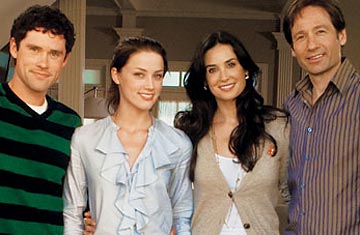
They're the perfect family foursome: Kate (Demi Moore) and Steve (David Duchovny) Jones and their teen kids Jenn (Amber Heard) and Mick (Ben Hollingsworth). They're handsome and genial, all-Americans whom everyone instantly likes, and would like to be. As the Joneses drive into the wealthy suburban area where their new home is, Steve smiles and says, "We are gonna do some serious damage in this town."
Damage? The people in this upmarket community instantly fall in love with the Joneses. Kate and Steve fit into their new surroundings, forming a special bond with their next-door neighbors Larry (Cary Cole) and Summer (Glenne Headly) as quickly and easily as Jenn and Mick become BFFs at the local high school. Ooh, and look at all the cool stuff — the golf clubs, electronics, cosmetics — that's already in the Joneses' lavishly appointed new digs. This family has everything, and everyone else wants it all. Is it affordable? We'll worry about that later.
In movies, no family is perfect — especially not here, in writer-director Derrick Borte's entertaining moral screed of a film. We get a hint of that at the end of their first day in their new neighborhood, as Kate grills Steve about his conversations at the golf course. "Did you make friends?" she asks, and he replies, "I did. I made friends." But he dines alone. That night, Steve leaves Kate to sleep in a separate bedroom, and then Jenn tiptoes in to have sex with him. When Kate breaks up the tryst, Jenn says, "Sorry, Dad." Yes, the Joneses have a secret, and it's not incest. Nor are they vampires, exactly (though that would make this clever social comedy easier to sell). Professional leeches is more like it.
Now here's the SPOILER ALERT — the reading of which will deprive the viewer of some nice surprises a third of the way through The Joneses, but without which any consideration of the film would be horribly hobbled. The four members of the Jones brood are stealth marketers, assembled as an ideal family by a "style marketing" firm called Life Image. The company knows that consumers don't buy the product; they buy the salesman. And they're more likely to purchase something if they think the salesman is a real person, like the new family of above-average citizens down the block. Those Life Image products will sell themselves, thanks to the radiant example of the Joneses. Buy like them, and be like them. Their neighbors don't realize that Steve and Kate's so-called life is one big Tupperware party.
Steve and Kate, Mick and Jenn are the logical, satirical extension of those college-age kids paid by companies to sit in a bar or a Starbucks and get overheard singing the praises of some fabulous gewgaw. In a larger sense, the Joneses are the smiling faces of our consumer-credit addiction. They're the pushers — those nice folks at the bank, say, selling balloon mortgages to poor people in the mid-2000s — in a country addicted to instant gratification. The bitter lesson the Joneses' neighbors find out in the story's final act, and that most Americans learned in late 2008 (when the movie was shot), is that eventually somebody has to pay up. And the cost could be your money and your life. END SPOILER ALERT.
Tone is everything in a social fable, and for most of the movie, Borte, a German-born video director making his first feature, shows an impressive command of mood and pace. Until Steve sees the real damage he has wreaked and belatedly gets a conscience, Borte doesn't push your face into the message of conspicuous consumerism; he lets the characters and actors breathe, allowing viewers to detect the toxic undertaste in their own good time. Duchovny (much more relaxed than in his X Files days) and Moore (getting her first decent role of the millennium) make a convincing couple. On the surface they're still cozy-cuddly in their 40s, a pair to admire and envy; behind the fancy faĉade, they are riven with job stress while still trying to make the business of a marriage work.
In its amiable, ambling way, The Joneses is a zeitgeist film: it says as much as a Michael Moore screed about the American way of debt. It's also a feature-length joke about Hollywood's mania for product placement — and an instructively entertaining way to spend an evening, with no hidden charges.
